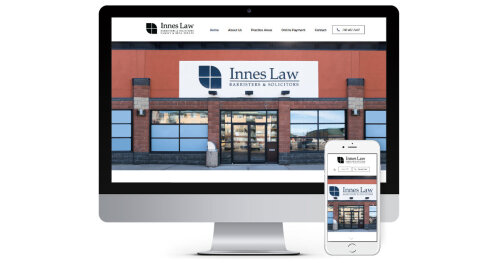Best Adoption Lawyers in Grande Prairie
Share your needs with us, get contacted by law firms.
Free. Takes 2 min.
Free Guide to Hiring a Family Lawyer
List of the best lawyers in Grande Prairie, Canada
About Adoption Law in Grande Prairie, Canada
Adoption in Grande Prairie, Canada, is governed by both provincial and federal laws aimed at protecting the welfare of children while supporting prospective adoptive parents through the process. Adoption is a legally binding process that permanently transfers all parental rights and responsibilities from the biological parents to the adoptive parents. In Grande Prairie, like in other parts of Alberta, the process can involve public adoption through a social services agency, private adoption, or intercountry adoption. Potential adoptive parents must go through thorough evaluations, and the process typically includes home studies, background checks, and adherence to laws that ensure the best interest of the child is the primary consideration.
Why You May Need a Lawyer
Navigating the adoption process can be complex, requiring a clear understanding of various legal implications and necessary paperwork. A lawyer specializing in adoption can offer support in several situations:
- Ensuring compliance with Alberta's adoption laws and regulations.
- Conducting safe and legal private adoptions.
- Assisting with matters of international adoption, which may involve understanding and managing laws in different jurisdictions.
- Supporting the rights of birth parents and adoptive parents during any disputes or misunderstandings.
- Providing legal representation in court if needed during the adoption approval process.
- Offering guidance on post-adoption issues including the integration of a child into the family or changes in legal status.
Local Laws Overview
The adoption process in Grande Prairie is primarily regulated by the Alberta Child, Youth and Family Enhancement Act. Some key aspects include:
- Consent: Birth parents must consent to an adoption unless their rights have been legally terminated.
- Home Study: Prospective adoptive parents must undergo a home study conducted by an authorized social worker to ensure a safe and supportive environment for the child.
- Matching Process: For public adoptions, social services facilitate matching children in need with suitable adoptive parents.
- Legal Finalization: Adoption must be legally finalized through the court, where a judge issues an adoption order.
- Open and Closed Adoptions: Both types are permissible, with varying levels of contact between birth parents and adoptive parents.
Frequently Asked Questions
What age do I need to be to adopt a child in Grande Prairie?
Prospective adoptive parents in Alberta must be at least 18 years old, but most agencies have additional criteria based on the age of the child for which they are adopting.
How long does the adoption process take?
The length of the adoption process in Grande Prairie can vary significantly, often ranging from several months to years, depending on the type of adoption and individual circumstances.
What is a home study, and why is it necessary?
A home study is an assessment of the prospective adoptive parents' living situation, conducted by a licensed social worker, to ensure a safe and nurturing home environment for the child.
Can single individuals adopt in Grande Prairie?
Yes, single individuals are eligible to adopt in Alberta, as long as they meet the other necessary criteria and demonstrate the ability to provide a safe, stable, and loving home.
What is the difference between an open and closed adoption?
An open adoption involves some level of contact or information exchange between the birth and adoptive families, whereas a closed adoption restricts access to such information.
Can birth parents reclaim custody after adoption?
Once an adoption is legally finalized in court, all parental rights are permanently transferred, and birth parents cannot reclaim custody except under fraudulent or extreme circumstances.
How much does it cost to adopt in Grande Prairie?
The cost can vary widely depending on the type of adoption; private and international adoptions tend to be more expensive due to legal and administrative expenses.
Can I adopt a child from another province or country?
Yes, interprovincial and international adoptions are possible, but they involve additional legal requirements and may need a lawyer to navigate multiple jurisdictions' laws.
What support is available for adoptive families post-adoption?
Support services vary but generally include counseling, access to healthcare benefits, and educational resources to assist with integration and familial adjustments.
Who needs to consent to an adoption?
The birth parents’ legal consent is required, unless their rights have been terminated or they are not legally fit to care for the child. The child, if over 12, may also need to consent.
Additional Resources
Here are some resources and organizations that might be helpful:
- Alberta Children's Services - Offers guidance and help with public adoptions.
- Private Adoption Agencies - Licensed agencies can provide information on private adoptions.
- Legal Aid Alberta - Provides legal advice and services for those who may not otherwise afford it.
- Adoption Council of Canada - A national resource for adoption-related information and advocacy.
Next Steps
If you are considering adoption and need legal assistance, it is recommended to:
- Contact a lawyer specializing in family and adoption law for a consultation.
- Research and choose a licensed adoption agency if pursuing private adoption.
- Prepare for the home study assessment and gather necessary documentation regarding your qualifications and stability as a prospective adoptive parent.
- Attend informational seminars or workshops offered by local community services about the adoption process.
- Reach out to support groups or networks of adoptive families for advice and shared experiences.
Lawzana helps you find the best lawyers and law firms in Grande Prairie through a curated and pre-screened list of qualified legal professionals. Our platform offers rankings and detailed profiles of attorneys and law firms, allowing you to compare based on practice areas, including Adoption, experience, and client feedback.
Each profile includes a description of the firm's areas of practice, client reviews, team members and partners, year of establishment, spoken languages, office locations, contact information, social media presence, and any published articles or resources. Most firms on our platform speak English and are experienced in both local and international legal matters.
Get a quote from top-rated law firms in Grande Prairie, Canada — quickly, securely, and without unnecessary hassle.
Disclaimer:
The information provided on this page is for general informational purposes only and does not constitute legal advice. While we strive to ensure the accuracy and relevance of the content, legal information may change over time, and interpretations of the law can vary. You should always consult with a qualified legal professional for advice specific to your situation.
We disclaim all liability for actions taken or not taken based on the content of this page. If you believe any information is incorrect or outdated, please contact us, and we will review and update it where appropriate.











